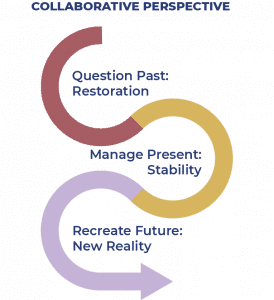
Today’s Traveller teams up with the Institute of Hotel Management, Aurangabad (IHM Aurangabad) in a dynamic and progressive initiative – #HospitalityFirst – that will bring incisive reports and data-based analysis to the current situation and solutions for the Hospitality industry for its long-term health and sustainability.
In this article, Dr Meena Sinha, Associate Professor – Management Studies and Head – Executive Education at Institute of Hotel Management, Aurangabad (IHM Aurangabad) shares insights on how the current crisis demands that leaders step up to create a collaborative perspective with a mindset that will Question the Past, Manage the Present and Recreate the Future.

Today’s Traveller : How do leaders stay ahead of the game in VUCA conditions?
Dr Meena Sinha – IHM Aurangabad: In order to stay ahead of the game in VUCA conditions, leaders have little choice but to adapt. Organisations need to embrace change actively in order to leverage technologies to cope with unsystematic economic developments.
The responsibility for the drive is squarely on leaders, who are unlikely to succeed without doing things differently in this fast-changing world. There has never been a greater moment of truth for humanity as leaders navigate through the crisis.
Leaders who do not value their role in managing this change will perish as the current situation envelops their inabilities to change. The onus on achieving organisational success in overcoming current challenges must be driven by active leadership of the situation.
Today’s Traveller : Are leaders courageous enough to resolve this ambiguity?
Dr Meena Sinha – IHM Aurangabad: The paradox in the crisis is making a choice between pushing forward, pausing to reflect and pulling back until there is relief. Are leaders courageous enough to deal with their own dilemmas and prioritise actions that will connect their organisations with future opportunities?
The challenge is to alternate between focussing on empathy and compromising on execution. The paradox is the need to deliver on both levels when plain survival can be overwhelming. Leaders need to adapt to momentary pressures while actively moving forward addressing the demands of new realities. What leaders need during a crisis is not a predefined response plan but behaviours and mindsets that help them look ahead.

Today’s Traveller : What can leaders do to balance strategic priorities with operating constraints?
Dr Meena Sinha – IHM Aurangabad: The current crisis demands that leaders step up to create a collaborative perspective, which is different from a traditional one. It depends on how change is prioritised by leaders with a view to meeting both expectations. Do leaders see their options as Time for Crisis Response, Time for Operational Restoration or Time for Strategic Thinking?
Question the Past, Manage the Present and Recreate the Future are some of the choices that can be collaborated. There are great lessons to be learnt from the framework, which is used by military leadership.
One good example of excellence where continuous improvement is seen is Toyota, a Japanese automotive manufacturer. Unit level leadership breed effective leaders who step into conflict. They choose development, embrace uncertainty, navigate through complexity, lead with empathy, incentivise curiosity, and deliver with passion taking fast, decisive and bold decisions. They believe in putting the mission first without compromising on operational designs created both with the heart and head in mind.
Today’s Traveller : How do leaders create a committed and purposeful culture?
Dr Meena Sinha – IHM Aurangabad: It takes bold leaders to strive hard as they move from surviving to thriving. It is all about demonstrating the right behaviours with the mindset of Resolution-Resilience-Reformation. New leadership narratives can be acquired from evolving new corporate wisdom.

This has many implications in the change process which has to be dealt with, with a deliberate calm and bounded optimism. Leaders can develop essential capabilities to accelerate re-invention in their organisations. New wisdom can be evolved from analysing existing operating systems for their ability to be reconfigured.
Leaders need to protect the core operation to build efficient and effective processes for continuous improvement. In parallel, the focus to pivot to new opportunities by reorienting to generate new revenue streams is a new imperative. General Motors, a car company is making ventilators now.
Today’s Traveller : What does it take for leaders to build critical capabilities to tackle change?
Dr Meena Sinha – IHM Aurangabad: Leaders have to be authentic, real, competent and caring in order to build the team’s faith. This ideology has its roots in Aristotle’s concept of pathos, logos and ethos. An authentic leader establishes a system architecture where the team can take decisions with accountability.
While leaders need a grasp of strategy to drive execution, each team member needs to feel motivated to contribute their might to add value. Authentic leaders continuously re-assess, build trust by inspiring engagement, ensure learning continuity and cultivate a growth mindset.
Leaders must leverage strengths rather than weaknesses, create immersive experiences by building personal adaptability and re-skill the team for new opportunities by fostering innovation. Reframing, introspecting and sublimating to build critical capabilities for accelerated reinvention and recalibrating multiple transformational initiatives is the need of the hour.
Read More: Hospitality First



